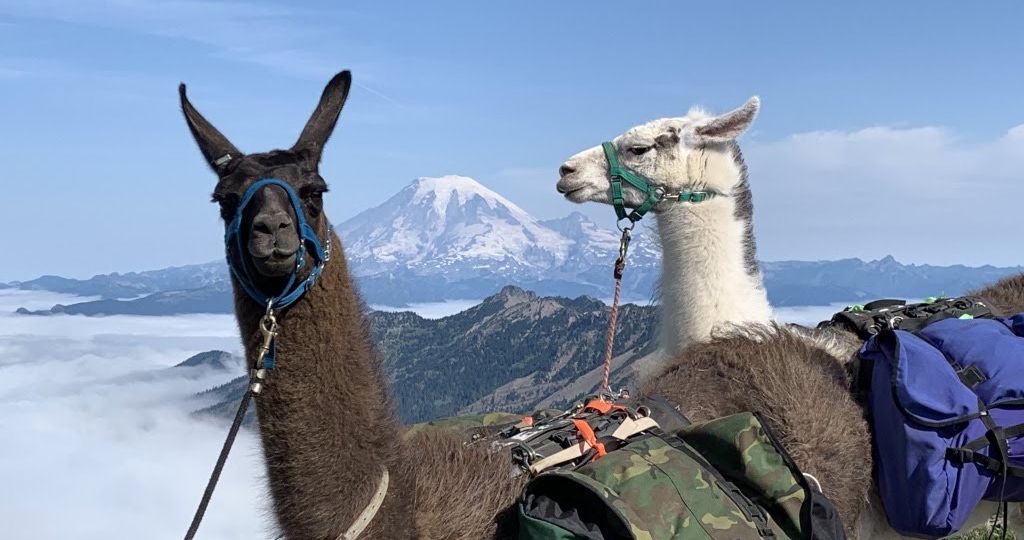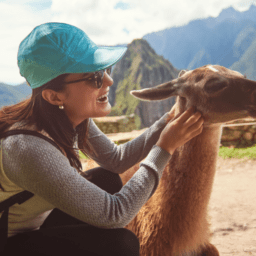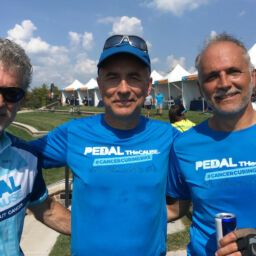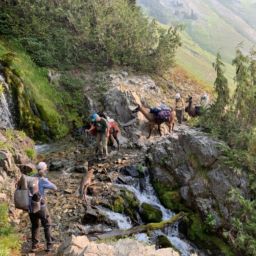With the goals of raising Parkinson’s awareness, demonstrating the benefits of exercise in managing Parkinson’s symptoms, and providing opportunities for people with Parkinson’s to participate in backcountry activities, Pass to Pass helps people with Parkinson’s live well.
Pass to Pass, which offers trips in the U.S. Pacific Northwest each summer, is an all-volunteer non-profit registered in Washington state. Sponsors and donors make it possible for the organization to offer trips with no registration fees, helping Pass to Pass fulfill its mission and keep the program affordable.
The organization was founded by Bill Meyer, who was diagnosed with Parkinson’s in 2009 at age 57. In 2016, he met with Ken Kisch to discuss how to make it easier for people with Parkinson’s to go backpacking. Since the first Pass to Pass hike that summer (a trek from Stevens Pass to Snoqualmie Pass), the program has grown and now includes hikes in three states, with a variety of options to help participants find a trip that fits their abilities.
Learning from each experience
Linda Lee, a Board of Directors member at Pass to Pass, says that after a test hike in 2015, the team realized they would need more than just financial support to make the program as safe and enjoyable as possible. They did this by not only adding more support hikers, but also horses to carry gear for the hikers living with Parkinson’s.
The horses, though, were expensive and were not flexible enough to meet the group’s needs. So, in 2017 the team began using pack llamas to carry gear. “Not only are the llamas cheaper for us, but they have been easier to work with and a lot of fun!” Linda says.
Switching from horses to llamas is not the only change that has improved the Pass to Pass program. “Over the last seven years, we’ve learned that it’s not about big miles or elevation gains,” Linda says.
“It’s about the shared experience and achieving personal goals. It’s about immersing ourselves in the journey through the mountains, with all their challenges and beauty.”
-Linda Lee
Having seen how increasing miles and elevation gains can negatively impact some hikers’ Parkinson’s symptoms, the leaders have also reduced the daily mileage and elevation gains throughout the years. The groups now hike from three to seven miles per day and, at most, experience a 1,500-foot gain or loss in a day.
New in 2022
There are several new aspects of the Pass to Pass program this summer. First, all trip leaders and assistants will be certified in wilderness first-aid. There are also more trip options, with varying degrees of difficulty; this summer will be the first year Pass to Pass is offering a trip made up completely of day hikes rather than multi-day, overnight backpacking trips.
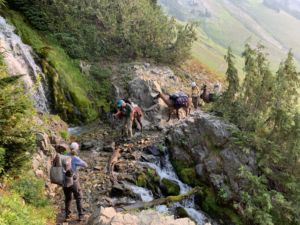
In 2022, trips will take place in Washington, Oregon, and California. “We’re also hoping someone will take the lead and start a Pass to Pass event in Colorado in 2023!” Linda says.
Friendships, support, and snacks
Before his first Pass to Pass trip, Mike Calbaum, who is living with Parkinson’s, was leery about spending five days hiking with seven complete strangers. By the end of the journey, however, he realized he’d “just spent five days hiking with seven of the nicest people I know.”
“I had such a great experience the first time, I couldn’t wait to go again the next year.”
-Mike Calbaum
Mike discovered the program through an internet search for “Parkinson’s and backpacking,” hoping to learn how other backpackers were handling their symptoms. “The way that Pass to Pass combined pack llamas and support hikers made a lot of sense,” he says, “so I applied for a place on one of the hikes.”
For him, the most rewarding aspect of the program is new friendships he’s made and the support the group gave (and continues to give) to each other. “Everyone is so ready to share anything that they have in their pack, from over-the-counter medicines to snacks to gear. If you even just appear to need something, someone will offer you anything in their possession to help you,” he says.
Diane Schuirman-Hagedorn, who has hiked with Pass to Pass for three summers and is now on the Board of Directors, agrees.
“The camaraderie, and how quickly you bond with strangers, is the most surprising part of the experience.”
–Diane Schuirman-Hagedorn
Diane first participated in a Pass to Pass hike four or five years after her Parkinson’s diagnosis. “I was ready to test my physical abilities,” she says. “My diagnosis took nearly six years. I went from walking five miles a day to having a long stretch where I literally could not walk a square block. With an accurate diagnosis and care plan, I regained some physical function, though I hadn’t attempted strenuous physical activity.” (Read more about Diane’s diagnosis journey and her experience working full-time with young onset Parkinson’s.)
In time, she says, after she’d met fellow people with Parkinson’s who had a can-do attitude, she took action, including her first Pass to Pass trip. Four years later, she says, “I keep participating because hiking with Pass to Pass is like showing up and being taken care of by favorite uncles.”
Linda, who serves as a support hiker for the program, says one of her favorite aspects of Pass to Pass is the people she meets. “I enjoy the tenacious spirit and positive, persevering attitudes of the Parkinson’s hikers,” she says. “They choose to take charge of their Parkinson’s; they don’t let it stop them from moving forward with life and gusto. I love being around people with this attitude.”
Like Mike and Diane, Linda also enjoys the camaraderie that comes from spending time with fellow wilderness lovers, as well as “the friendships that have been made and the experiences that have been shared over the years.”
Prepare to succeed
To participate in a Pass to Pass trip, hikers need to be able to hike 3-7 miles per day, up to 1,500 feet of elevation, carrying a 15-18 pound backpack. They should also be able to navigate rocky terrain and steep sections of trail, step over tree roots, and more. (For the full list of preparations and requirements for hikers, click here.)

Mike’s advice to someone with Parkinson’s who is interested in this kind of trek but has reservations? “If you’re physically able to handle hiking 10 miles on a good Parkinson’s day, then don’t worry about having a bad day while hiking. Your group will understand what you are going through and will get you through.”
Diane suggests people interested in participating start by exercising.
“The best way to prepare for a hike is to hike,” she says. “The more prepared you are, the more fun you’ll have. Second, learn about hiking safety. Third, learn about hiking gear and how to pack light. I’m still working on that last part.”
Pass to Pass hikers living with Parkinson’s should also know they will have plenty of support along the way. Support hikers are part of every trip, and their primary role is, Linda says, “to always be physically and emotionally prepared to support the Parkinson’s hikers in any way needed.”
Support can include setting up and taking down tents; preparing food and filtering water; monitoring medication schedules and being alert for signs of fatigue; helping with movements on steep terrain and over logs and creeks; and much more. Support hikers also help with the llamas: they load and weigh pannier bags; saddle and lead llamas along the trail; stake out safe grazing areas; water and feed the llamas; and more.
Learn More
Interested in participating in a Pass to Pass hike, either as a hiker living with Parkinson’s or a support hiker? Learn more about summer 2022 and past trips at passtopass.org.


